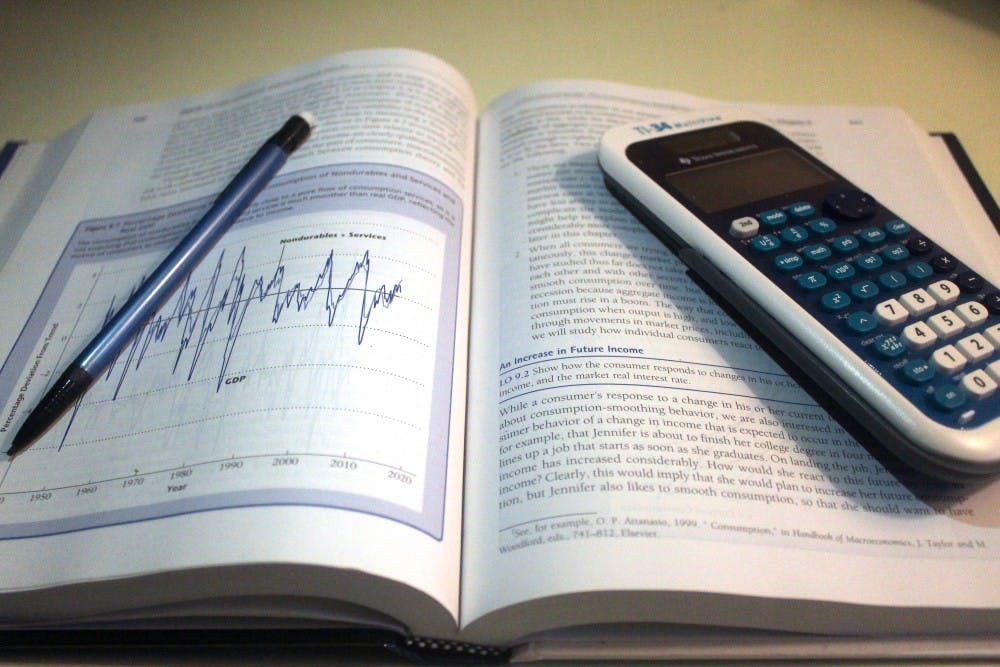 Cornell, Columbia, Yale, Brown, and Princeton have already reclassified their economics major as a STEM major, but Penn has not yet followed suit. In January 2018, Penn administrators were considering reclassifying economics as a STEM major, which would help international students navigate the work visa application process. But more than a year later, the department is no longer exploring the option. Penn's economics department is sticking to its current classifications, Associate Dean of the College and Director of Academic Affairs Kent Peterman wrote in an email to The Daily Pennsylvanian. “My understanding is that they have a STEM major and are happy with the current configuration of options for students interested in Economics,” Peterman wrote. "Those who want to pursue a STEM major should declare Mathematical Economics." Students are currently able to major in mathematical economics, which has a significantly heavier mathematics course load and is four course units more than the traditional major. The major was created to satisfy the STEM classification for international students, Economics Undergraduate Chair Holger Sieg wrote in an emailed statement. “The Penn students should be pleased that we made every effort to come up with a STEM degree more than five years ago,” Sieg wrote. "Anybody who wants to study Economics and needs the STEM classification because of immigration related issues, we recommend that they should get a degree in MathEcon." Dean of the College Steven Fluharty told the DP last year that Penn was still considering the change after Yale University designated its economics major as a STEM program. “The Department of Homeland Security classifies ‘Econometric and Quantitative Economics’ as a STEM field for the purpose of a STEM OPT Extension, and the SAS Ph.D. program in Economics is now classified in this category," Fluharty wrote in an emailed statement. "The Economics department has begun exploring whether it is appropriate to seek this classification for its undergraduate program.” Fluharty, however, wrote in an email Feb. 21 that he had "nothing further to add" to the comments of Peterman and Sieg. Many of Penn’s peer Ivy League universities, including Cornell University, Columbia University, Brown University, and Princeton University, have recently designated their economics majors to be classified as STEM programs. The changes came after the Department of Homeland Security designated "Econometric and Quantitative Economics" as a STEM degree program in 2012. The reclassification to STEM major is especially significant for international students who are permitted by United States Citizenship and Immigration Services to use their student visa to remain and work in the United States. Most student visas are valid for up to a year after graduation during the Optional Practice Training — but majoring in STEM-designated programs allows students to extend the OPT period an extra two years. Despite Penn's decision to stop exploring the option, international students still advocate for the economics major to be reclassified as a STEM program.
“I think [it should be reclassified] because in economics, although it's in the social sciences, there are a lot of maths and analysis that requires the skill of STEM majors that apply to economics as well," said College freshman Ramona Sripitak, an international student from Thailand. The OPT extension is important for international students because it provides opportunities for them to gain experience working in the United States along with benefits that people may not be able to get in their home countries, College junior Gehna Nandwani said. Given the mathematical economics major's STEM classification, international students feel pushed towards the major. “The visa side of things definitely had a decent amount of influence on my decision to do mathematical economics," said College freshman Shivin Uppal, an international student from India. "But to be fair I think I've always been the kind of person who's liked math and econ individually as subjects.” But Uppal does see an issue with the mathematical economics major because of the large amount of required math courses that are not focused on the study of economics. “My parents sent me here for education for four years and it's a big, huge, investment,” said Nandwani, who is also an international student from India. “I'm not just here to get a degree and go back home. I want to do something with my life.” |
GMT-4, 2024-11-30 03:43 , Processed in 0.033276 second(s), 19 queries .